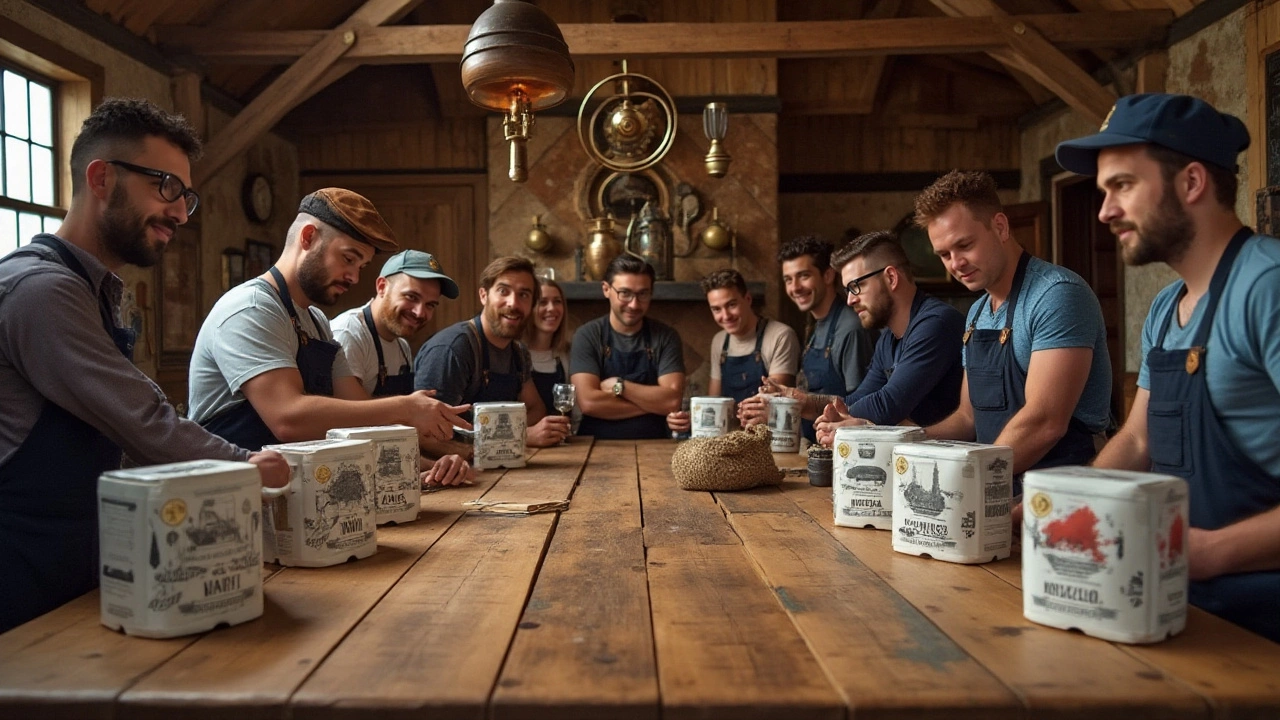In recent years, homebrewing has become more than just a hobby; it's a craft that captures the imagination and taste buds of many. For those looking to start their brewing adventures, choosing the right homebrew kit is crucial. Whether you're a beginner or a seasoned brewer, finding a kit that meets your needs can be the difference between an exceptional craft beer and an average one.
This article takes you through a journey of exploring various homebrew kits available in the market. We aim to provide insights into what makes a kit stand out and how particular features can ease your brewing process. From beginners' kits that focus on simplicity to advanced setups that give you full control over the brewing process, every brewer can find something to suit their taste and skill level.
Come with us as we delve into the world of hops, grains, and fermentation, and discover which homebrew kits can elevate your brewing game. Whether your goal is to impress friends with your latest IPA creation or just enjoy the exhilarating process of crafting your own beer, the right kit will set you on the path to brewing greatness.
- Introduction to Homebrew Kits
- Features to Consider
- Top Picks for Beginners
- Advanced Kits for Enthusiasts
- Final Thoughts and Tips
Introduction to Homebrew Kits
Embarking on the homebrewing journey is akin to stepping into a laboratory, where the alchemy of yeast, hops, and malt create magic in a bottle. Each sip of homebrewed beer is a testament to personal effort, creativity, and the choice of the right equipment. This section aims to guide you through the essentials of choosing the ideal homebrew kit, aligning your brewing ambitions with the tools at your disposal. Our exploration begins with understanding what constitutes a good homebrew kit, unraveling the components that differentiate a basic kit from one tailored to the seasoned brewer.
Homebrew kits generally consist of essential tools and ingredients to start brewing right away. A typical kit includes a fermenter, airlock, siphon, sanitizer, and an instruction manual. They also offer brewing ingredients like malt extract, yeast, and hops. For beginners, kits often focus on simplicity, providing pre-measured ingredients and easy-to-follow instructions. Meanwhile, advanced kits might come with upgraded fermenters, carboys, and more sophisticated carbonation tools, offering greater control over the brewing process. Each kit is designed to meet different skill levels and preferences, which makes the selection quite vast. Take careful note of what each kit offers before making your decision.
There's a rich variety of brewing kits on the market, each catering to specific tastes and experiences. Some kits are specifically designed for IPAs or lagers, while others offer a variety of beer styles. For example, a beginner homebrew kit might include easy-to-brew ale recipes, allowing newcomers to enjoy the brewing process without frustration. For those seeking a deeper dive, premium kits might offer tools for crafting stouts, pale ales, or even experimental brews, often including grains or alternative hop selections to expand the flavor profile of your brew. Options are plentiful, and the choice ultimately comes down to personal preference and brewing ambition.
It's interesting to note that the resurgence of homebrewing is tied closely to the craft beer movement, which has seen remarkable growth over the last decade. Homebrewing today is as much about experimentation and customization as it is about tradition. According to the American Homebrewers Association, there are an estimated 1.2 million homebrewers in the United States alone, whose diverse tastes have driven innovation in kit offerings. This demand push ensures a continually evolving selection of homebrew kits, keeping the hobby both fresh and challenging.
"Homebrewing is about more than just making beer. It's an exploration of flavors, a journey into science, and a tradition that connects people across continents and generations." - Charlie Papazian, the late founder of the American Homebrewers Association and renowned brewing guru.
Let’s not forget the joy of personalization that comes with brewing at home. Not only does brewing your own beer allow for a wide array of taste testing, but it also offers you the chance to brand your own creations. Many homebrewers find a personal connection with their unique brews, gifting them to friends and family or even keeping detailed tasting notes to refine their recipes. This personal touch extends to labeling, where homebrewers can enjoy designing their labels, making each bottle a bespoke gift. Such involvement is what truly makes homebrewing a craft.
Features to Consider
When diving into the world of homebrew kits, it's essential to know what to look for to ensure a satisfying brewing experience. First-time brewers often get starry-eyed by the idea of creating their craft beer, but the reality of brewing is such that the right kit can significantly impact both the process and the final product. Multiple factors play a pivotal role in determining which kit is best suited for you, and understanding these factors is key to making an informed decision.
The size of the batch you wish to brew should be one of your initial considerations. Many beginner homebrew kits target those who want to brew smaller quantities, often around one gallon, allowing novice brewers to test out their skills without too much investment. However, serious hobbyists or those who wish to brew on a larger scale should look into kits that can handle five gallons or more, as it allows for more production and experimentation. It's crucial to align the kit's capacity with your brewing goals.
Quality of materials is another significant consideration. Most kits include items like fermenters, bottles, and airlocks. While these components might seem basic, their durability and build quality greatly affect the efficiency and ease of brewing. Look for kits providing items made of food-grade plastic or glass. Kits that come with glass carboys usually last longer and provide a clearer view of the fermentation process. Stainless steel often tops glass in terms of being less prone to breakage and easier to clean.
Another aspect to focus on is the ingredients included in the kit. Good quality ingredients lead to good quality beer. Many beginner homebrew kits come with malt extract, which simplifies brewing and ensures consistent results. As you advance, you may lean towards all-grain brewing. Kits that offer flexible ingredient options are quite beneficial as they allow the brewer to grow their skills gradually without needing a new kit for each advancement.
"Having the right tools is crucial, but having the right knowledge and creativity is what transforms a good brew into a great one." – Charlie Papazian, author of 'The Complete Joy of Homebrewing'
Ease of use should never be underestimated. Kits designed for beginners often come with detailed instructions, video tutorials, and sometimes even dedicated customer support. Advanced kits may assume a bit of prior knowledge, but ideally, the package should still include a guide or a resource to ensure you are not left in the dark.
Cost is undeniably a factor for many. Finding a balance between cost and quality can be tricky, but it is entirely feasible. Investing a little more up front on a kit with durable materials and useful components can save money in the long run. Remember, cheaper isn’t always better if you'll need replacements or upgrades sooner than expected.
Finally, consider the brand's reputation. Researching reviews and getting feedback from seasoned brewers on forums can shed light on whether a kit is worth its price tag. Established brands often provide warranty or return options, giving peace of mind for new brewers or those trying a complex system for the first time. It’s also worth checking whether the company offers additional resources or communities that you can tap into for support and ideas.

Top Picks for Beginners
Stepping into the vibrant world of homebrewing can be both exciting and daunting, especially for beginners. With numerous options to choose from, finding the right kit that matches your skill level and enthusiasm requires a keen eye for detail. The best homebrew kits for beginners should offer simplicity without compromising on quality, enabling you to dive straight into the brewing process with confidence.
One popular choice among novices is the Brewer's Best Deluxe Kit. This kit streamlines the brewing process, offering a comprehensive package that contains everything you need to get started, including beginner-friendly instructions. What sets this kit apart is its focus on quality equipment, such as a glass carboy and hydrometer, which can help even beginners achieve professional-grade results.
The Northern Brewer's Homebrewing Starter Set is another standout. This kit combines ease of use with adaptability, providing beginners a pathway to explore different brewing techniques once they become more comfortable. It's a great choice for anyone looking to dip their toes into the hobby without making an overwhelming investment. With its wide array of ingredients and reliable equipment, this kit often receives high praise from brewing communities.
According to brewing expert John Palmer, "Having a well-rounded starter kit equips new brewers with the essential tools and knowledge to nurture their passion for brewing. It's not just about the beers you make; it's the journey of creativity and learning."
While some kits, like the Coopers DIY Beer Kit, focus on speed and simplicity — allowing brewers to craft their beer within a few weeks — others, such as the Craft A Brew Home Beer Brewing Kit, emphasize the art of traditional brewing, teaching beginners the patience required to create more complex flavors. These differences cater to various learning styles and preferences, making it easier for new brewers to choose an option that best suits their needs.
When selecting a homebrew kit, it's vital to consider the kind of experience you want to create. Some look for a quick and easy way to brew their first batch, prioritizing immediate results, while others might relish the chance to learn and experiment with traditional techniques. Always check the included equipment list and instructions before making a purchase, and don't hesitate to join local homebrew clubs or online forums to exchange tips and experiences.
To help guide your buying decision, a useful tip is to start with a kit that grants you flexibility. Kits like the Brooklyn Brew Shop's Beer Making Kit are affordable, space-saving options that allow room for expansion. They provide an excellent entry point into the world of crafting different brews while offering the possibility to grow in complexity as your skills develop. With precise measurements and premium components, they lead to successful home brewing experiences time and time again.
Advanced Kits for Enthusiasts
For those who have spent years honing their craft, basic kits might not cut it anymore. Enter the world of advanced homebrew kits, where customization and sophistication allow brewers to truly experiment and perfect their craft. These kits come equipped with everything needed to push the boundaries of your brewing skills. They include high-quality fermenters, temperature control systems, and even digital hydrometers to ensure you consistently hit the right notes in your brew.
An advanced kit often includes multi-stage brewing systems that can handle more complex recipes. This allows you greater control over different phases of the brewing process, from the mash to the boil and fermentation. Such kits cater to those fervent about balancing each element in their brew, offering an opportunity to master esoteric styles that aren’t typically attempted with basic equipment. These systems often mimic professional setups, which gives enthusiasts a real feel for what commercial operations might entail.
The Importance of Temperature Control
A significant upgrade in advanced kits is the inclusion of sophisticated temperature control. A constant fermentation temperature can significantly affect the final product, and these advanced systems make it easier to maintain the perfect environment. Some use high-end conical fermenters with cooling jackets, which help maintain temperature stability crucial for brewing lagers and other temperature-sensitive styles. Incidentally, a study from the American Society of Brewing Chemists highlighted that consistent temperature control could reduce unwanted esters and off-flavors, enhancing the beer's quality.
The key to a great brew isn't just in the recipe; it's in the control you exert over every step. Advanced kits allow enthusiasts to experiment with brews that were once only dreams. - John Palmer, Author of 'How to Brew'
Customization and Scalability
Advanced brewing kits also offer an array of customization options, tailored to the specific needs of an enthusiast. Whether it's adjustable sparge arms, programmable controllers, or pumps for automated wort transfer, every component serves to refine the brewing process and enhance flavor profiles. For those looking at scalability, some kits include the ability to handle larger batches, making them suitable as a stepping stone for those considering moving into professional brewing. This kind of scalability is crucial for brewers who wish to share their creations with a wider audience or enter competition circuits.
What sets a great advanced kit apart is not just its individual components, but how intuitively those components work together. Crafting a perfect IPA or a complex saison requires not only skill but also the right tools. Advanced kits do more than offer high-end gear; they replace guesswork with precision, empowering homebrewers to achieve commercial-quality results at home.

Final Thoughts and Tips
Embarking on the journey of homebrewing is much like learning a new art form: it requires patience, practice, and a dash of creativity. When you've sifted through the myriad of homebrew kits and settled on your chosen arsenal, remember that mastering the craft isn’t an overnight journey. Kick off your brewing with simpler recipes to gain confidence. Once you’re comfortable, let your palate guide you into more complex flavor profiles. Many experienced brewers suggest keeping a detailed journal of your brewing process. Record everything from the type of yeast to the fermentation duration, which serves as a valuable reference and a learning tool.
Investing in quality ingredients is as important as having the right homebrew kit. Don’t skimp on high-quality grains, hops, and yeast. Unlike store-bought ingredients, fresh components can dramatically enhance the taste of your brew. If you're aiming to replicate a favorite commercial beer, try to gather knowledge about its ingredients. Note that temperature control during fermentation can make or break your brew's taste. While many kits come with basic equipment, a digital thermometer helps in maintaining precise temperature settings, crucial for achieving the desired taste and consistency.
"The beauty of homebrewing is the freedom it gives you to experiment and make mistakes. Each misstep is another step closer to your perfect brew," shared John Palmer, a well-respected author on brewing techniques.Once your homebrew is bottled, the waiting game begins. Allowing your beer time to mature can enhance its flavor complexity and depth. Though the typical waiting period is around two weeks, some brews might need more time to reach their full potential. While you're waiting, make sure to store your bottles in a cool, dark place to prevent flavor loss. Sharing your creations with friends can yield constructive feedback, turning your brewing hobby into a community experience.
Using the right cleaning techniques ensures that your efforts don't succumb to spoilage. Sterilize all equipment before and after use. An unclean bottleneck or fermenter can ruin an entire batch, leading to undesired flavors. More advanced brewers sometimes implement a secondary fermentation to improve clarity and flavor. It involves transferring the beer to another container for an extended fermentation period. Although not critical for beginners, it's a useful step if you’re chasing that crystal-clear finish.
Whether you're planning a solo craft night or hosting a tasting event for friends, pay attention to presentation. Properly labeling your homemade brews not only adds a personal touch but helps differentiate batch versions and recipes. Remember, brewing your beer is about expression and enjoying the process. So don’t rush through it. Enjoy the ritual of brewing, and sip with pride when your concoction hits just the right note.
To sum it up, starting with the best homebrew kit sets the foundation for your craft. With time, care, and a bit of experimentation, you’ll witness improvement not just in process efficiency but in your beer’s taste quality, ultimately making each brewing episode a memorable one.


